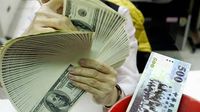The Taiwan stock market experienced a dramatic plunge of over two thousand points on April 7, 2025, largely attributed to the repercussions of former President Donald Trump's tax policies. As the markets reacted to the shock, the central bank intervened decisively, curbing the New Taiwan dollar's depreciation with significant financial measures.
According to Tsai Chiung-min, the Director of the Central Bank's Foreign Exchange Bureau, the central bank is equipped with sufficient capacity to handle exchange rate fluctuations. He stated, "The central bank absolutely has enough ability to respond to exchange market volatility," and detailed the implementation of four major exchange rate stabilization mechanisms. These mechanisms include utilizing a large-amount foreign exchange settlement immediate reporting system to monitor capital inflows and outflows.
On the same day, the exchange market witnessed a remarkable turnaround, reversing a depreciation of 1.42 points to an appreciation of 3.3 points, closing at 32.55 New Taiwan dollars. The central bank is estimated to have spent at least US$800 million to limit the New Taiwan dollar's depreciation during this turbulent period. The trading volume soared to an impressive US$5.395 billion, reflecting the market's volatility.
Tsai noted that the decline in the stock market was largely due to the need to digest selling pressure accumulated over the two-day holiday. Despite the market's turmoil, foreign investors remained active, net buying Taiwan stocks by over 100 billion yuan. Tsai emphasized the importance of foreign investors in the exchange market, stating, "Foreign investors are a significant guiding force in the exchange market, but exporters will operate based on international exchange market trends."
The central bank's proactive measures are designed to prevent large-scale withdrawals of hot money, which could exacerbate liquidity issues in the domestic financial markets. Tsai explained that the central bank would step in if market supply and demand imbalances resulted in excessive fluctuations in the New Taiwan dollar exchange rate. He reassured the public that the bank is prepared to maintain sufficient foreign exchange liquidity and provide capital liquidity to the domestic financial market.
In a broader context, from 2016 to April 7, 2025, the Taiwan stock market has seen a cumulative increase of 130.7%, placing it among the top performers in major global stock markets. During this period, the Bank for International Settlements (BIS) reported that the nominal effective exchange rate (NEER) of the New Taiwan dollar increased by 10.39%. Additionally, since 2010, the NEER has appreciated by 19.4%, reflecting the robust fundamentals of Taiwan's economy.
As of the end of March 2025, Taiwan's foreign exchange reserves stood at a substantial US$578.02 billion, with projections indicating that foreign currency liquidity could reach as high as US$694.2 billion by the end of December 2024. This strong financial position underscores the country's long-term trade surplus and healthy international balance of payments, alongside very low levels of foreign debt.
To further mitigate the risks posed by potential hot money withdrawals, the central bank is employing various strategies, including interbank lending, foreign exchange swaps, open market operations, and adjustments to deposit reserve ratios. Tsai highlighted that the central bank has allocated US$20 billion, 10 billion euros, and 800 billion Japanese yen from its foreign exchange reserves as part of a 'seed fund' to inject foreign exchange liquidity into the market as needed.
Despite the challenges posed by external economic pressures, Tsai remains optimistic about Taiwan's economic fundamentals. He pointed out that the economy is performing well, and the mechanisms in place are designed to stabilize the market and ensure liquidity. The central bank's readiness to intervene in the foreign exchange market aims to maintain stability and confidence among investors and the general public.
In summary, the recent fluctuations in the Taiwan stock market and currency exchange rates have highlighted the critical role of the central bank in managing economic stability. With a proactive approach and robust financial reserves, the central bank aims to navigate the complexities of the current economic landscape while safeguarding Taiwan's financial health.





